Betta fish are one of the most popular fish that you can find in homes. They are known for their vibrant colors and their ferocious attitudes. Bettas are normally very easy to take care of, and they are great for newcomers in the fish-owning world. However, it’s important to know how to take care of betta fish, especially if you plan on leaving it for a few days.
How long can betta fish live without food?
Bettas can live without food for up to 14 days thanks to their small stomachs and instincts from their wild habitats. Surviving isn’t thriving, though – after 4 to 5 days with no food bettas will start tapping into their reserves and enter the beginning stages of starvation.
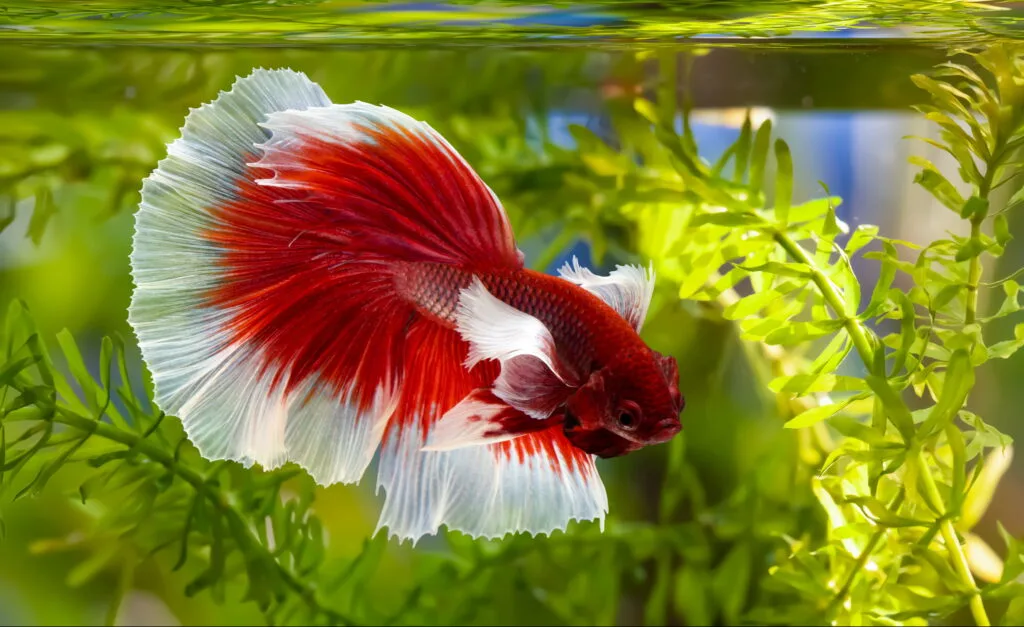
Bettas can indeed live without food, but to make sure you know how to keep your betta healthy and happy, we’ll walk you through just how long the fish can live without food, why betta fish can live without food, and the best tips for leaving your pet while on vacation. Don’t worry – you’ll do swimmingly!
Table of Contents
How Long Can a Betta Fish Live Without Food? Why?
Betta fish are tough, resilient fish. They’re also special in the sense that they actually can live without food.
Exactly how long can betta fish live without food? What effects does this have on them? Why are they able to live without food? Let’s take a look.
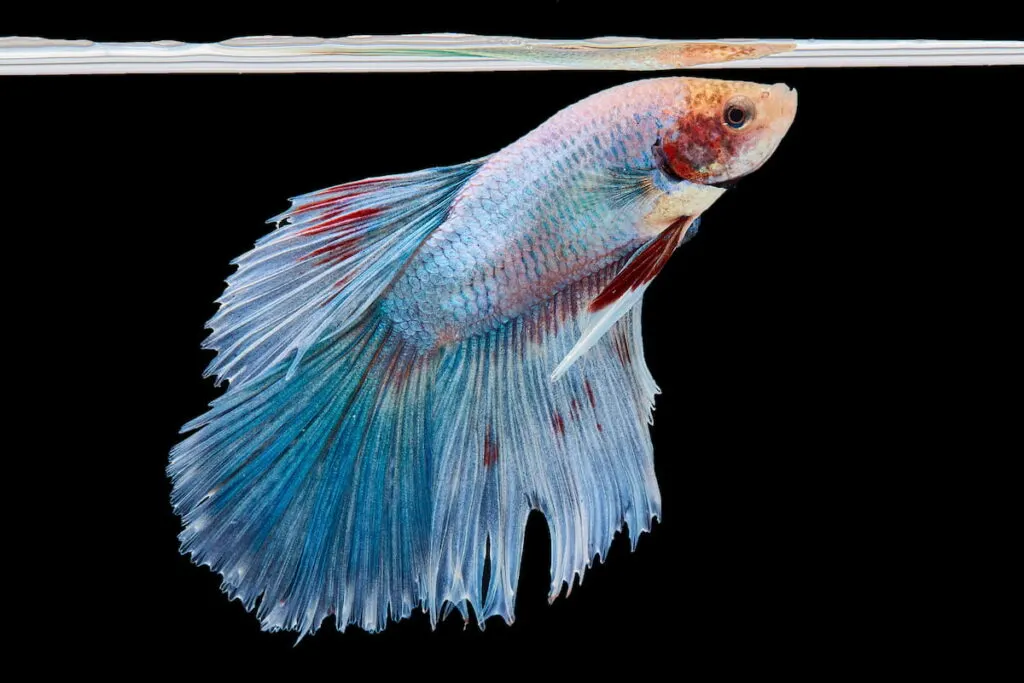
How Long Can a Betta Fish Can Live Without Food
Betta fish can live without food for up to 14 days. However, just because a betta can survive up to 14 days without food doesn’t mean they thrive without food.
At about 4 to 5 days without food, betta fish begin tapping into their bodies’ reserves and enter the beginning stages of starvation.
Although it is healthy for bettas to have at least one day a week without food, it’s unhealthy for them to live without food for extended periods of time (source).
Prolonged amounts of time without food can cause a betta fish’s kidneys to shut down and can even lead to more organs shutting down.
Not only that, but when bettas go prolonged periods without food, their immune systems become weakened – leaving them at a higher risk for contracting diseases and illnesses they wouldn’t otherwise (source).
Why Betta Fish Can Live Without Food
Most animals can’t live without food – especially as long as up to 14 days like betta fish can. So, why are bettas able to live without food for up to two weeks? There are two main reasons.
Betta Fish Have Small Stomachs
They have notoriously small stomachs. So small, in fact, that a betta fish’s stomach is only about as big as one of its eyes!
Because betta fish have such small stomachs, they really don’t need a lot of food at any given time. In fact, it’s healthy for bettas not to have an overabundance of food at any given time.
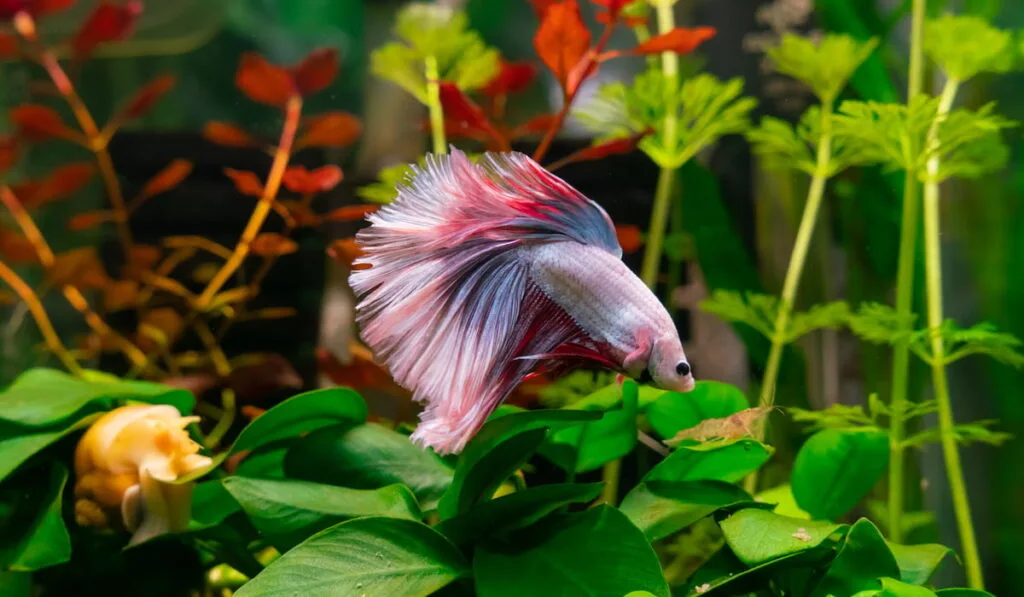
Why? Even though betta fish have such small stomachs, they will absolutely overeat if given a chance. Overeating causes issues like bloating, constipation, disease contraction, swim bladder issues, and even obesity (source).
Bettas Don’t Constantly Eat in the Wild
Betta fish also follow their instincts that they’d normally have in their wild habitats.
In the wild, they usually don’t get food every single day. Because of that, bettas can go without food – just like they might have to in the wild.
Leaving Your Betta While on Vacation
Many fish owners want to know how long a betta can live without food because they need to leave their pet fish for a vacation or trip.
It can often be tough to find pet sitters or someone to come by and take care of a betta while away on vacation, so we’ll take a look at the best tips for leaving your betta while you’re on vacation.
Tips for Leaving Your Betta While on Vacation
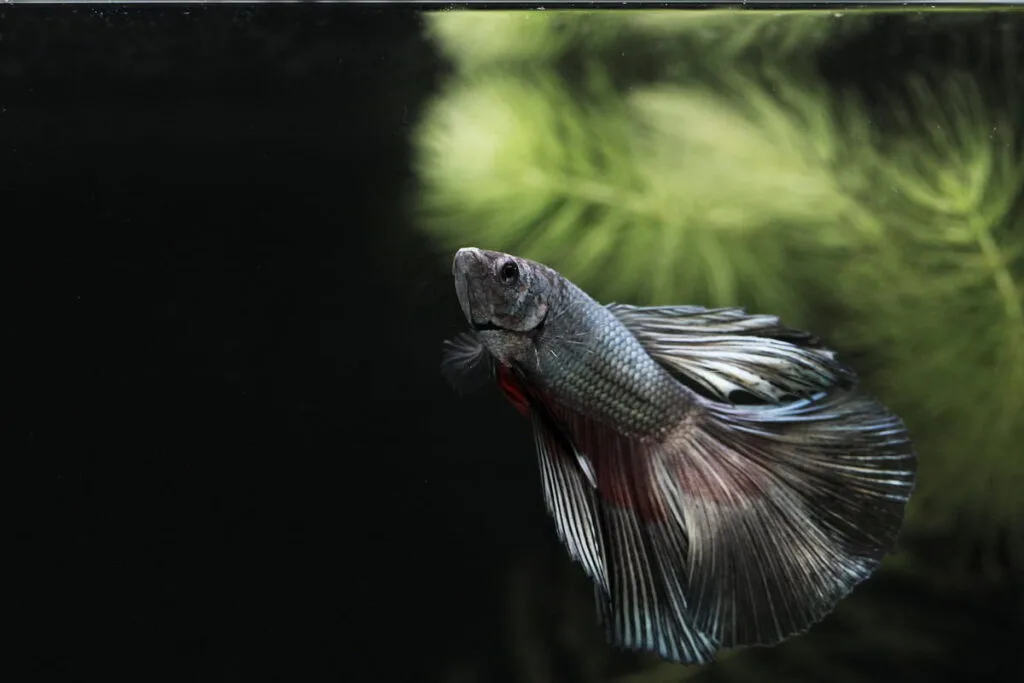
If you’re planning on leaving on a vacation or a trip but aren’t able to find someone to take care of your fish, you’re probably wondering how you can safely leave your betta behind.
Below are tips for leaving your betta while on vacation if you don’t have a caregiver for your pet.
Know Your Timelines for Leaving a Betta Without Food
It’s important to know your timelines for leaving a betta without food. After all, they can go without food, but only for specific amounts of time.
If you’re going on a trip for anywhere up to 4 days, your betta should be fine to fast during that time. If you plan on going for a trip a bit longer, the maximum amount of time you should leave without feeding your betta is 4 to 7 days.
Don’t push your vacation longer than seven days if you can’t keep your betta’s normal feeding schedule (source).
Don’t Add Extra Food Before Leaving
Some fish owners might think it’s a good idea to leave excess of food in the tank before leaving for vacation in the hopes the extra food serves them.
For bettas, the opposite is true. You should never add extra food to a betta’s tank before leaving! Here’s why:
- The food will turn into ammonia and pollute the water as it breaks down, potentially making the water toxic for the betta fish
- Your fish may overeat, leading to various health issues
Give Regular Feedings When You Leave and When You Come Back
It’s healthiest for your betta if you give it a regular feeding on the day you leave for your trip, and right when you get back from your trip.
Consider an Automatic Feeder for the Betta Fish
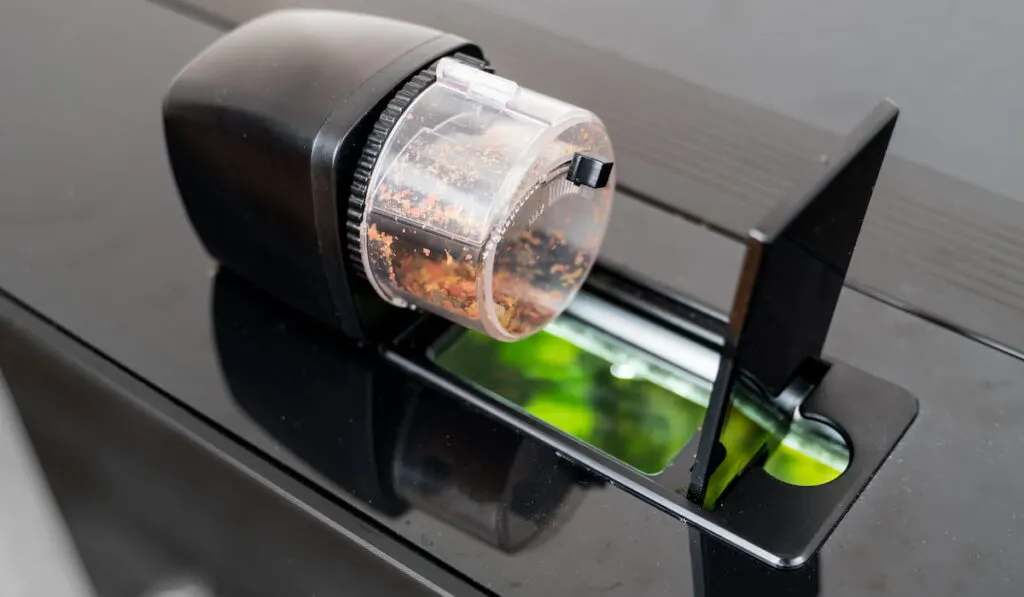
If you’re worried about leaving your betta without food while you go on vacation, you may want to consider investing in an automatic feeder.
If you want to consider an automatic feeder for your betta, make sure to try it out for at least a week before you leave to make sure it works properly.
An automatic fish feeder we recommend is the Fish Mate F14 Aquarium Fish Feeder. We like that it can dispense all types of fish food, including flakes. It even has a low battery indicator, which is handy if you’re leaving on a trip.
Other Concerns for Long Absences from Betta Fish
Making sure your betta fish stays happy and healthy while you’re gone isn’t all about food – there may be some other concerns and factors to be considered when leaving your betta for an extended period of time.
Water Loss Through Evaporation
It’s no secret that water evaporates. Because water evaporates, water can be lost from a betta’s tank. This can be a cause for concern while you’re on vacation and have left your betta at home.
It’s normal for fish tanks to lose about an inch of water per week. More than that can cause problems for your betta, especially if you won’t be around to replenish the water.
Water can evaporate from a betta’s tank for several reasons, like:
- Heat as the water temperature rises
- The lid being left off the tank or the tank not having a lid
- The tank being brightly lit or in a brightly lit area
To try and prevent water loss from a betta’s tank because of evaporation, we recommend you have a lid on the tank and keep the tank water at 78 to 82 degrees Fahrenheit – the temperature in which bettas do best.
Algae Accumulation in the Betta’s Tank
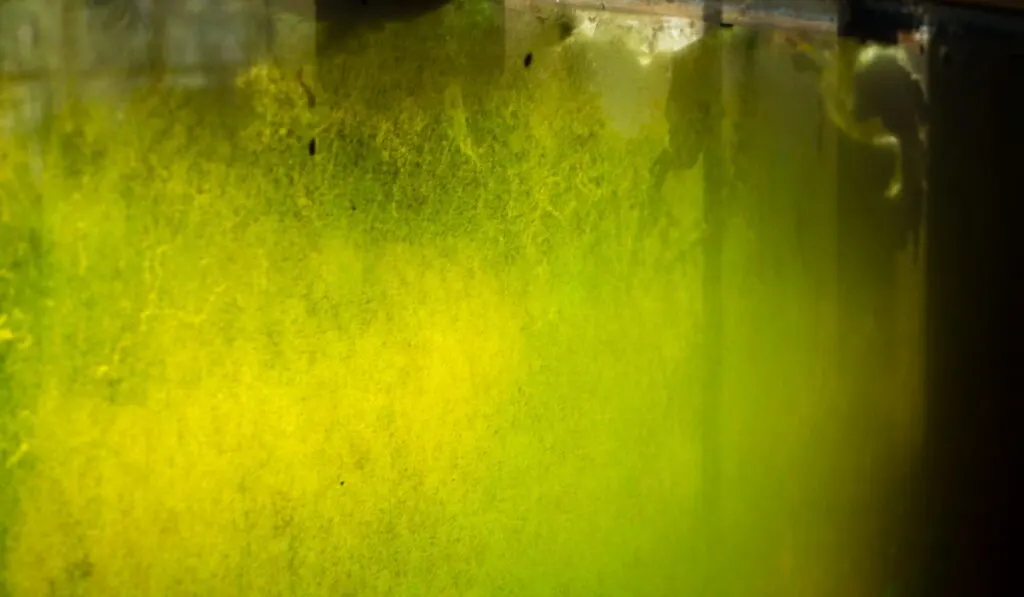
Algae accumulation can be another cause for concern when leaving a betta for an extended period of time.
Brown algae are commonly found in betta tanks. While brown algae isn’t necessarily harmful to them, it can kill any plants in the tank, and may indicate that the rest of the conditions in the tank aren’t healthy for the betta (source).
To prevent algae accumulation in your betta’s tank while you’re on vacation, make sure to thoroughly clean your betta’s tank right before you leave. You’ll also want to consider cleaning your betta’s tank again as soon as you get back.
Bottom Line
Betta fish are tough and resilient and can survive without food for up to 14 days. However, they should only be left without food at a maximum of 7 days to circumvent them developing serious health issues and entering the beginning stages of starvation.
If you’re going on vacation and need to leave your betta fish without a caregiver, don’t worry too much – as long as you follow the tips for leaving your betta while on vacation (and don’t leave longer than seven days) you and your betta should be good to go.
